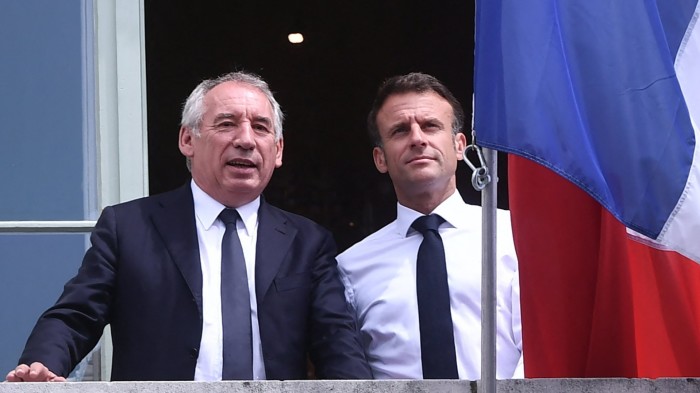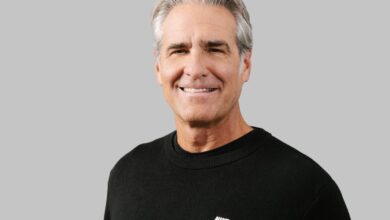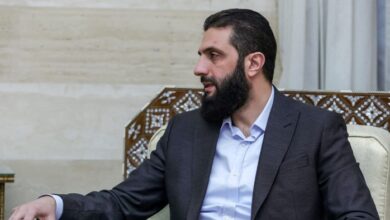François Bayrou is appointed prime minister of France

President Emmanuel Macron has chosen longtime ally François Bayrou as prime minister in a bid to stabilize the political turmoil in France that has bogged down his second term.
The appointment of the 73-year-old centrist came after a tense meeting lasting nearly two hours at the Élysée Palace, sparking speculation that Mr. Macron had considered other names at the last minute.
It comes after a year of political turmoil, in which Macron has now appointed three prime ministers – a crisis that has deepened as the president called and failed in early elections in July that left him without a party Which faction or coalition has the majority in the National Assembly?
Bayrou faces the task of building a government with full cross-party support to survive a vote of confidence, pass a budget and reassure financial markets and businesses reeling from the crisis. recent instability.
The scale of that task was underlined on Friday night when Moody’s cut France’s credit rating from Aa2 to Aa3.
The rating agency said the move “reflects our view that the country’s public finances will weaken significantly in the coming years”.
“In a highly politically fragmented environment, there is now little likelihood that the next government will sustainably reduce the size of the fiscal deficit beyond next year,” Moody’s said.
The political crisis has weakened Macron on the international stage, just as neighboring Germany is preparing for early elections in February. With US President-elect Donald Trump set to take office next month, both of the EU’s leading powers are weakened by instability.
“Everyone knows the difficulty of the task and everyone also knows that there is a path forward that can unite people instead of dividing them. . . There is a long way to go,” Bayrou said Friday afternoon shortly after the appointment.
Bayrou’s predecessor, Michel Barnier, the EU’s former Brexit negotiator, was ousted last week in a vote of no confidence in Parliament after less than three months in office. Barnier’s government was voted out of cutting the budget deficit for next year, an obstacle Bayrou will now have to overcome despite not having a majority in parliament.
A three-time presidential candidate himself, the new prime minister combines a market-oriented economic outlook with support for social justice measures such as taxing the rich.
He also called for proportional voting to promote a culture of compromise in parliament and devolve more power from Paris to the rest of the country.
But his appointment immediately drew criticism from Macron’s opponents, including the far-right Rassemblement National (RN) party of Marine Le Pen, Macron’s arch-rival who was instrumental in ousting Barnier.
“Macron is a bunker president, and his new prime minister must take into account the new political situation,” said Jordan Bardella, leader of the RN party. He added: “He must accept that he does not have democratic legitimacy or a majority in parliament, so must dialogue with all parties.”
The moderate left, whose support was crucial in neutralizing the RN, also expressed dissatisfaction with Bayrou’s appointment.
Chloé Ridel, a spokeswoman for the Socialist Party, criticized Macron for choosing an ally instead of a candidate from the left, the frontrunner in July’s parliamentary elections.
“If Bayrou wants our support, he will have to take steps to implement parts of our agenda, such as pensions or wages,” she said.
A person close to Macron defended the choice, saying that Bayrou “in recent days has emerged as the most consensus figure. . . And [the one] most suitable to form the national unity government called for by the president.”
“His task will be to engage in dialogue with all political parties,” this person added. . . to establish the conditions for stability and effective action.”
Uncertainty is currently taking its toll French politics A contrast not only to Macron’s first term, when he enjoyed a commanding majority, but also to much of the history of the 66-year-old Fifth Republic, in which most governments have proved relatively stable .
Investment and growth slowed down, and unemployment rates rose during the political crisis.
France is under pressure to narrow its budget deficit, which will be 6% of national output by the end of this year – well beyond the EU’s limit of 3% of GDP.
Macron has sought to prepare the ground for the new government with a non-aggression pact with opposition party leaders – with the exception of the far right and far left.
To get rid of the RN, he and Bayrou would need to reach an agreement with the Socialist Party, who hold 66 seats, and perhaps the Green Party with 38 seats and the Communist Party with 17 seats, while not losing the right wing .
Fabien Roussel, head of the communist party, said nominating a loyalist as prime minister sent “a bad signal that is not what the public wants”, adding: “They want change political direction and there is little opportunity for that at the moment. .”
However, in a more conciliatory tone, he added: “We will not automatically criticize this new government and will judge based on his actions.”
Much will depend on how far Bayrou deviates from Macron’s pro-business and tax-cutting policies to chart his own course.
His support was key to Macron’s first election in 2017 and his MoDem party backing the president. But legal difficulties forced him to resign as Macron’s first justice minister after just a month in office.
Bayrou and his party are accused of embezzling EU funds by using Brussels staff for national political activities. He was acquitted this year, but prosecutors appealed, raising the possibility of a retrial.
If another prime minister falls, pressure will increase on Macron, whose presidency has two and a half years left, to step down to break the political deadlock.
The president insists he will not resign because he wants to push for more reforms and defend previous changes such as raising the retirement age and efforts to make France more attractive to investors.
In a survey conducted by pollster Elabe this week, just 6% of respondents said they wanted a prime minister from Macron’s moderate camp, compared with 41% who wanted a non-political choice.
But a majority of respondents – 76% – said they wanted the parties to find a compromise to end the unrest, a sign that the opposition could risk toppling another government .
According to a separate Elabe poll on Thursday, Macron’s popularity has fallen to a record low since his election in 2017, with just 21% of people confident that he can resolve the problems. French problem.
Among potential prime ministerial candidates, Bayrou received the support of only 29% of respondents in the same poll.
Data visualization by Janina Conboye





